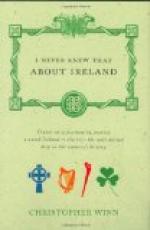And I have it on the word of honour of one whose word is his bond, that certain defaulting tenants lately confessed to him that they had in their pockets as much as the value of three years’ rent for the two they owed, but that they dared not, for their lives, pay it. They would if they dared, but they dared not. The plea of inability to pay the reduced scale of rent is for the most part simple moonshine; and the terrorism imported into this question comes from the Campaigners, not from the landlords, nor yet from the police. If these paid political agitators were silenced, and if the laws already passed were suffered to work by themselves according to their intent, things would speedily settle. But then the agitators would lose their means of subsistence, their social status, and their political importance. As things are these men are ruining the country they affect to defend; while the worst enemies of the peasant are those who call themselves his friends, and the blind-eyed sympathisers who bewail the wrongs he does not suffer and the misery he himself might prevent. All that Ireland wants now is rest from political agitation, the orderly development of its resources;—and especially finality in legislation;[E]—so that the one side may know to what it has to trust, and the other may be freed from those illusive dreams and demoralising hopes which destroy the manlier efforts after self-help in the present for that universal amelioration to be found in the coming of the cocklicranes in the future.
There is, however, a good work quietly going on which will touch the evil root of things in time, but not in the sense of the Home Rulers and Campaigners. This good work will render it unnecessary to follow the advice of that rough and ready politician who saw no way out of the wood save to “send to Hell for Oliver Cromwell”; also that of the facetious Dove who winked as he offered his olive branch:—“Shure the best way to pacify Oireland is for the Queen to marry Parnell.” A more practicable method than either is silently making headway against the elements of disorder; and in spite of the upsetters and their opposition the rough things will be made smooth, and, the troubled waters will run clear, if only the Government of order may be allowed time to do its beneficent work of repression and re-establishment thoroughly and to the roots.




